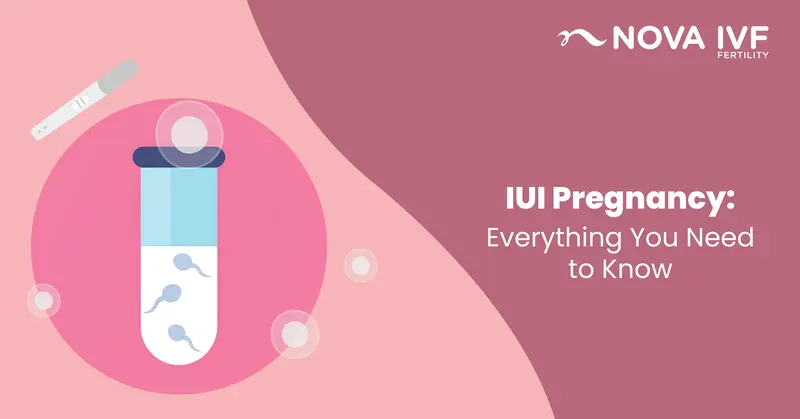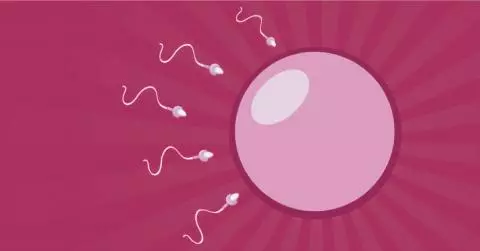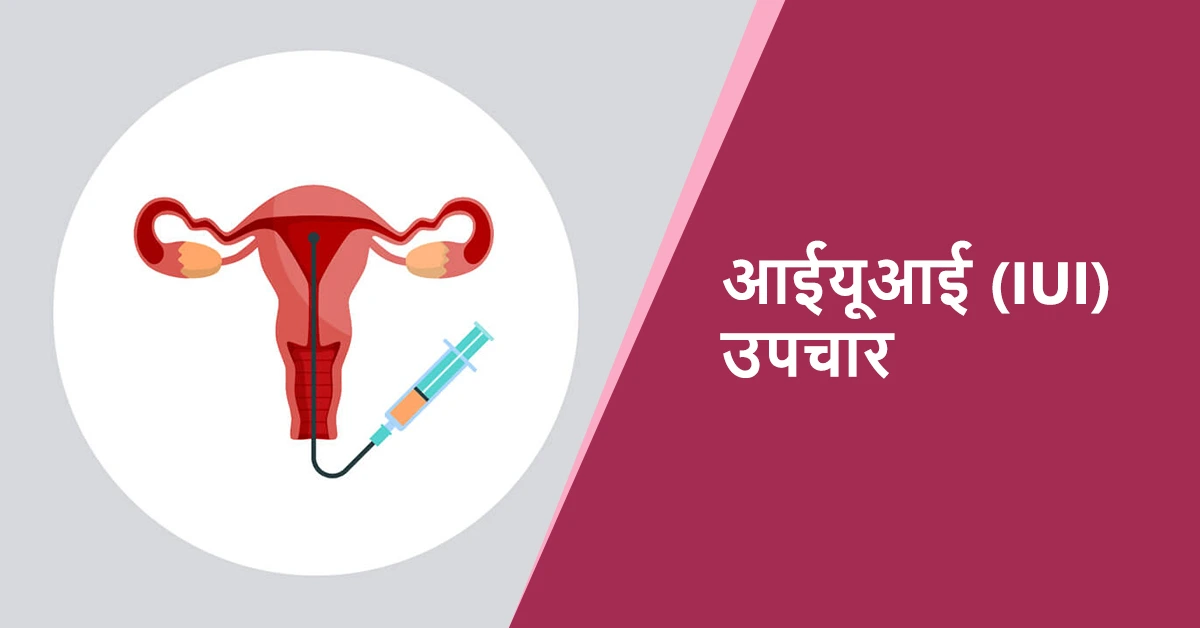IUI Pregnancy

IUI Pregnancy
While getting pregnant can be a dream come true for those looking to start a family, it can be equally challenging for people dealing with fertility issues. Thankfully, the advent of modern medicine has provided a range of solutions that allow you to conceive despite infertility concerns. While you may have heard of a few more mainstream solutions, you may not be familiar with the breadth and width of medical solutions available. One such solution is an IUI pregnancy, also known as an Intrauterine Insemination. Whether you know the procedure on a surface level or are unfamiliar with it, here's everything you need to know about what an IUI treatment for pregnancy is.
What is IUI Pregnancy?
If you’re wondering, “What is an IUI treatment for pregnancy?” we’ve got the answers. The acronym IUI stands for intrauterine insemination. In common parlance, the procedure is also popularly known as artificial insemination.
IUI is a procedure that helps address infertility concerns. The procedure is designed to improve your chances of conceiving by transferring the best quality sperms directly into your uterus. at the same time when the woman’s ovary releases eggs. The reason for doing so is to increase the odds of the sperm and egg merging in the uterus. If the procedure is successful, the result is a pregnancy.
Normally, medical professionals will try to make sure the timing of an IUI procedure aligns with your menstrual cycle. If you’re unaware, one of a woman’s two ovaries will release an egg during the monthly menstrual cycle. Carrying out an IUI in time with the menstrual cycle only boosts the chances of the procedure being successful. Another alternative is to use fertility medicines to help the ovaries produce eggs. Which method is used during an IUI will largely depend on the underlying cause of infertility.
What are the Reasons for Opting for IUI Treatment for Pregnancy?
IUI is a procedure usually used to treat infertility issues. Whether you’re a couple or an individual, you may face infertility due to various underlying reasons. IUI is most commonly used for people who are dealing with:
Sperm from a Donor:
If you are trying to conceive using sperm donated by an individual unknown to you, you will most likely require IUI. Getting impregnated by donor sperm has become a popular option for people who are single or if their partner’s sperm count or quality is low. Usually, people trying to get artificially inseminated may acquire donor sperm from certified labs, sperm banks, etc. where it is often frozen to preserve it. The sperm is thawed out before commencing the IUI procedure.
Unexplained Infertility:
If you’re struggling to get pregnant and doctors cannot discern a specific cause, the first line of treatment may be an IUI. Along with the procedure, medicines that will encourage egg growth in the ovaries are also used.
Endometriosis-related Infertility:
You may have heard of the condition of endometriosis where in the lining of your uterus grows outside the organ. Endometriosis can be a leading cause of infertility among women. One of the first treatments used to tackle infertility due to endometriosis is to source an egg of good quality and proceed with IUI.
Mild Male Infertility:
Mild male factor infertility refers to a type of infertility experienced by couples due to semen, the fluid that carries sperm. It is also popularly known as subfertility. The condition is diagnosed via a test known as semen analysis that looks for issues with the size, shape, amount, or movement of sperm. If the test denotes that a man is suffering from such issues, an IUI is recommended to overcome the same. IUI entails preparing the sperm and helps earmark higher quality sperm from those of inferior quality.
Cervical Factor Infertility:
Issues with the cervix, the narrower, lower bit of the uterus, can also be a cause for infertility. The cervix acts as an opening between the uterus and the vagina and secrets mucus every time the ovary releases an egg. This process is known as ovulation. The mucus is instrumental in helping the sperm travel from the vagina to either one of the fallopian tubes where an egg is ready for fertilization. However, if this mucus is too thick, it may become an obstacle for the sperm to move towards the egg. Additionally, scarring from procedures like a biopsy can also thicken the cervix. IUI helps circumvent the cervix and increases the odds of a pregnancy occurring. The procedure plants sperm directly into the uterus and increases the number of sperm that can fertilise the egg.
Ovulatory Factor Infertility:
If a woman is facing problems with ovulation, such as a lack of ovulation or fewer eggs, IUI can help address any infertility caused by the same.
Semen Allergy:
Although rare, some women can be allergic to proteins in semen, which can cause a reaction. If a person suffers from this condition, they will experience burning and swelling when the penis ejaculates semen into the vagina. Ideally, a condom helps protect a woman from such unpleasant feelings. However, it can also serve as an obstacle if the person concerned is trying to conceive. IUI allows anyone suffering from this condition to get pregnant without having to deal with the painful side effects of a semen allergy. The procedure entails removing the proteins present in semen and can make the act of conceiving painless for anyone with this allergy.
What are the Risks Involved with IUI Pregnancy Insemination?
Normally, an IUI poses little to no risk and is a safe procedure. While the risks associated with the procedure are low, here are a few side effects that may occur:
- Infection: Although the chances are slight, you may contract an infection after an IUI.
- Spotting: An IUI entails inserting a thin tube, also known as a catheter, into your vagina up to your uterus. The sperm is then injected through the tube. Sometimes placing the catheter may cause a little vaginal bleeding, also known as spotting. Spotting does not affect the chances of a pregnancy occurring.
- Multiple Pregnancies: IUI, on its own, is not linked to an increased chance of getting pregnant with twins, triplets, or multiple babies. However, when the procedure is executed in tandem with fertility medicines, the chances of multiple pregnancies increase. If a woman does get pregnant with multiple babies, the risks associated increase and include issues like early labour and low birth weight.
What is the Process of IUI Pregnancy?
Pre-Procedure:
Before the IUI procedure, you may have to take the following steps:
Track Ovulation: Since timing is integral to the success of IUI, you have to keep track of bodily signs that indicate you might be ovulating. You can use an at-home urine ovulation kit to predict when you’re ovulating with a certain amount of accuracy. Such kits are designed to detect when your body produces or secrete the luteinizing hormone that causes the ovary to release an egg. You can also opt for tests like transvaginal ultrasound that take images of your ovaries and egg growth. Another alternative is to take a shot of human chorionic gonadotropin (HCG) or similar medications to ensure you ovulate at least one or more eggs at the correct time.
Set the Right Time for the Procedure: Usually, IUIs are conducted one or two days after tests show signs of ovulation. It’s best to consult a doctor who can draw out a plan regarding the timing of your procedure and what comes next.
Prepare the Semen Sample: Your donor or partner will provide a semen sample at the clinic or hospital you’ve approached for the IUI. The sample has to be washed to separate the healthy active sperm from low-quality sperm. Washing the sample also removes substances that could cause reactions like severe cramps. To boost the chances of getting pregnant, it is best to use a small and highly concentrated amount of healthy sperm.
The Procedure:
An IUI usually takes place in a doctor’s office or clinic and takes only a few minutes after preparing the sperm sample. Ideally, you should not require any medications or pain relievers. Ensure that only a doctor or specifically trained nurse practitioner conducts the procedure.
The procedure entails lying down on a regular exam table with your legs fitted into stirrups. A speculum, which is a tool made out of plastic or metal is used to spread your vaginal walls. The doctor/nurse will then affix a vial with the healthy sperm to the end of a catheter and place it into the vagina. The catheter will travel through the cervix and into the uterus. The doctor/nurse will then push the sperm into the uterus using the catheter and once the procedure is completed the catheter and speculum will be removed.
Post-Procedure
Once the sperm has been deposited into your uterus, you must lie down for a while. As soon as the procedure is officially over, you can get dressed and carry on with your day as usual. Light spotting a couple of days following an IUI is normal.
IUI Pregnancy at Nova IVF: Why Choose Us?
Nova IVF Fertility (NIF) is one of the largest and most reliable service providers in fertility treatment in India as per global standards. Equipped with modern technology, a team who are experts in their field, and a mission to make reproductive health of the highest quality available to Indians, Nova IVF is where your dream of becoming a parent can come true.
FAQs About IUI Pregnancy
Q. What is the IUI pregnancy’s cost?
A. Normally a cycle of IUI procedure costs around Rs 10,000. However, the amount will vary as per the hospital selected and whether you live in a Tier I, II, or III city.
Q. What are the chances of pregnancy with IUI?
A. The success rate of IUI depends on age and is generally as follows:
- Below 35 years- 13%
- 35 to 37 years - 10%
- 38 to 40 years - 9%
- Over 40 years - 3 to 9%
Q. After IUI, what are the symptoms of pregnancy?
A. After an IUI, the symptoms of pregnancy are just as they would be had you conceived via regular intercourse.
 Infertility Counselling
Infertility Counselling Female Infertility Treatment
Female Infertility Treatment Andrology Treatment
Andrology Treatment Fertility Enhancing Surgeries - Female
Fertility Enhancing Surgeries - Female Fertility Enhancing Surgeries - Male
Fertility Enhancing Surgeries - Male Endoscopy Treatment
Endoscopy Treatment IUI Treatment
IUI Treatment IVF Treatment
IVF Treatment ICSI Treatment
ICSI Treatment Advanced IVF Solutions
Advanced IVF Solutions Embryology
Embryology Vitrification Egg, Embryo, Sperm Freezing
Vitrification Egg, Embryo, Sperm Freezing Preimplantation Genetic Testing (PGT)
Preimplantation Genetic Testing (PGT) Donation Program Embryo / Egg / Sperm
Donation Program Embryo / Egg / Sperm Self-cycleTM IVF
Self-cycleTM IVF

 Self-cycleTM IVF
Self-cycleTM IVF










